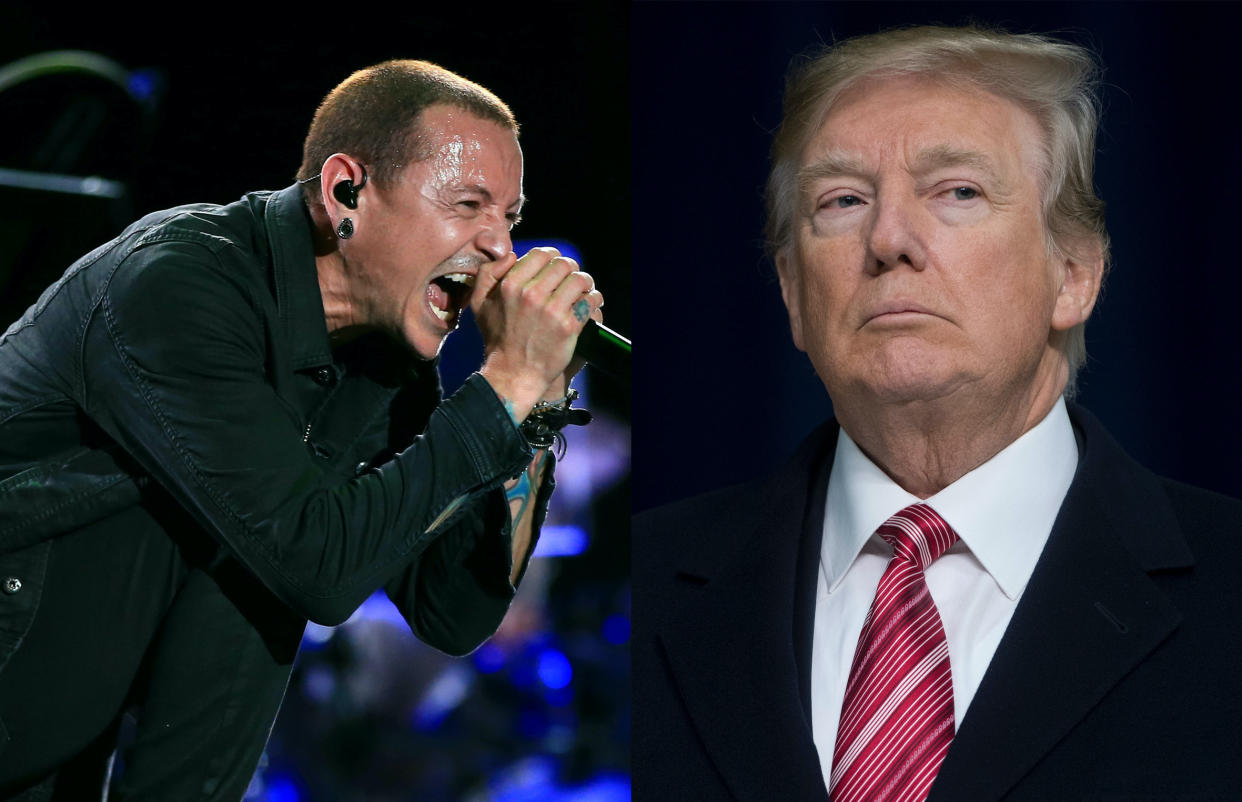Linkin Park succeeds in getting fan-made Trump campaign ad pulled from Twitter

- Oops!Something went wrong.Please try again later.
Linkin Park fans were furious Saturday, when President Trump retweeted a fan-made re-election campaign ad that used the alternative rock band’s music — noting that late Linkin Park frontman Chester Bennington was vehemently anti-Trump and had believed that the president was “a greater threat to the USA than terrorism.”
The controversial two-minute video in question — which had been tweeted a day earlier by White House social media director Dan Scavino — mashed up a cover by Fleurie and Jung Youth of Linkin Park’s 2002 hit “In the End” with audio from Trump's 2017 inaugural address, and depicted presumed Democratic presidential nominee Joe Biden as a member of the “Washington elite.”
As Trump violates copyrights of using Linkin Park's music... Here is a reminder how Chester felt about the current man in office pic.twitter.com/DOSoeiKMrW
— John "Wear a frickin MASK" Dotson (@DRockDot) July 18, 2020
The surviving Linkin Park band members shared their fans’ outrage, tweeting, “Linkin Park did not and does not endorse Trump, nor authorize his organization to use any of our music. A cease and desist has been issued.” Jung Youth also commented on Trump’s tweet, writing, “F*** Trump!!!! Def do not approve this usage of my music just FYI.”
Linkin Park did not and does not endorse Trump, nor authorize his organization to use any of our music. A cease and desist has been issued.
— LINKIN PARK (@linkinpark) July 19, 2020
Within hours of Linkin Park’s public denouncement — while the band’s name was still trending on Twitter — the offending video was pulled, after Twitter received a Digital Millennium Copyright Act notice from Machine Shop Entertainment (the management company owned by Linkin Park). The new error notification read: "This media has been disabled in response to a report by the copyright owner.” In an email statement to Reuters, a Twitter spokesperson said, “We respond to valid copyright complaints sent to us by a copyright owner or their authorized representatives.”
That awkward moment when Linkin Park calls you out for copyright infringement 20 minutes after you post a campaign ad.
Imagine being busted for stealing LINKIN PARK songs. That’s like getting caught pirating Amazing Spider-Man 2 pic.twitter.com/cDEfUeQKFk— Ryan Arey (@ryanarey) July 19, 2020
Twitter has disabled a tweet posted by President Donald Trump earlier today which contained the music of Linkin Park.
This was a 2015 tweet from the band’s late singer, Chester Bennington. https://t.co/OZdR7CExMk— Travis Akers (@travisakers) July 19, 2020
Linkin Park is among many artists that have complained about Trump playing their music: Just recently, both Neil Young and the Rolling Stones protested the president’s respective use of “Rockin’ in the Free World” and “You Can’t Always Get What You Want” at his rallies. But at political rallies taking place at large, established venues that have "public performance" licenses with organizations like ASCAP, BMI, and SESAC, such music usage is usually legal without the artists’ consent.
Related video: Rolling Stones threaten lawsuit over Trump's music use
However, playing music in a campaign ad — be it an official spot, or a fan-created one like the “In the End” video tweeted by President Trump this weekend — require approval, as would be the case for any sort of commercial. The licenses needed for unauthorized political ads "are essentially the same [as official ads], even if the responsibility doesn't lie with the campaign," Kevin Erickson, director of the Future of Music Coalition, explained to Pitchfork in 2016.
Linkin Park - 1
Donald Trump - 0 pic.twitter.com/8rJKmQ500P— SFDB (@sfdb) July 19, 2020
Earlier today I found out that trump illegally used a cover song that I am part of in a propaganda video which he tweeted...anyone who knows me knows I stand firmly against bigotry and racism. Much love to everyone in the twitter community who helped get the video taken down fr!!
— JUNG YOUTH (@JUNGYOUTHmusic) July 19, 2020
Read more from Yahoo Entertainment:
Skid Row's Sebastian Bach: 'If you support Donald Trump, you stand against rock 'n' roll'
Nirvana bassist Krist Novoselic deletes Twitter after backlash for supporting Trump
Chuck D talks Public Enemy’s incendiary new anti-Trump song: 'This dude has got to go now'
Taylor Swift blasts President Trump in incendiary tweet: ‘We will vote you out in November’


